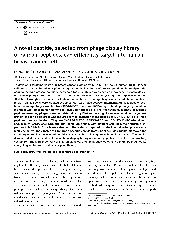摘要
To develop a targeting vector for breast cancer biotherapy, MDA-MB-231 cell, a human breast cancer cell line, was co-cultured with pC89 (9 aa) phage display library of random peptides. In multiple independent peptide-presenting phage screening trials, subtilisin was used as a protease to inactivate extra-cellular phages. The internalized phages were collected by cell lysising and amplified in E. coli XLI-Blue. Through five rounds of selection, the peptide-presenting phages which could be internalized in MDA-MB-231 cells were isolated. A comparison was made between internalization capacities of peptide-presenting phages isolated from MDA-MB-231 cells and RGD-integrin binding phage by coculturing them with other human tumor cell lines and normal cells. The nucleotide sequences of isolated peptide-presenting phages were then determined by DNA sequencing. To uncover whether phage coat protein or amino acid order was required for the character of the peptide to MDA-MB-231 cells, three peptides were synthesized. They are CASPSGALRSC, ASPSGALRS and CGVIFDHSVPC (the shifted sequence of CASPSGALRSC), and after coculturing them with different cell lines, their targeting capacities to MDA-MB-231 cells were detected. These data suggested that the internalization process was highly selective, and capable of capturing a specific peptide from parent peptide variants. Moreover, the targeting internalization event of peptides was an amino acid sequence dependent manner. The results demonstrated the feasibility of using phage display library of random peptides to develop new targeting system for intracellular delivery of macromolecules, and the peptide we obtained might be modified as a targeting vector for breast cancer gene therapy.
- 出版日期2008-3
- 单位昆明医科大学
